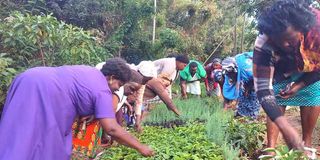Baringo women’s group combating climate change one tree at a time

Members of Remco women’s group tend their tree and fruit nursery at Emunyar in Kapropita, Baringo Central, on February 13, 2024. The group is fighting the effects of climate change by planting trees.
What you need to know:
- Amidst the tranquil landscapes of Kapropita village is a tale of resilience and empowerment.
- The collective spirit of 42 women has seen them transform from a table banking group into environmental defenders planting thousands of trees.
A group of women from the rural Kenyan village of Kapropita are waging war armed only with shovels and saplings.
While their weapons may seem meagre, these 42 mothers and grandmothers are fighting a formidable enemy: climate change.
Through an ingenious cooperative they call Remco Environmental Conservation and Horticulture, the rural women are fighting back tree by tree.
Also read: Chamas with wealth and influence
Their unlikely story began in 2012 with a humble savings club whose objective was to improve their living standards and that of their families.
Out of that cooperative spirit grew a grassroots green movement that has already planted more than 7,000 trees to mitigate drought and flooding brought on by climate change, which were threatening their community’s survival.
They started off doing table banking, a group-based strategy that helps them save and take low-interest loans. However, the drastic impacts of climate change stared them in the face.
Also read: Join a ‘chama’ to achieve your goals
Prolonged droughts devastated communities while flooding displaced families. Women and children suffered most.
After the outbreak of Covid-19, they went a notch higher. They had borne the brunt of the effects of climate change and wanted to provide a solution.
At the time, several families in Baringo South had been displaced from their homes by a drastic rise in water levels in lakes Baringo and Bogoria.
Other families in the arid and semi-arid lands were on the verge of starvation due to famine.
The long dry spell had also led to inter-communal fights over limited resources, including water and pasture, a move that sparked the killing of people and displacement of others from their homes.
Elizabeth Komen, the chairperson, says with the adverse effects of climate change, they had to seek solutions.
“Women, particularly in this region, have borne the brunt of climate change, ranging from flooding to dry spell, and forced to live in shanties with their children after being displaced by floods. Others walk several kilometres to get water during the dry spell,” Elizabeth says.
“We started off as an empowerment group in 2012 by doing table banking. In 2021 after the outbreak of Covid-19, climate change was taking its toll. We decided help mitigate its effects.”
The women noticed that people were dumping refuse into the Emunyar spring that feeds Kirandich Dam, a major source of water for thousands of locals.
They approached the Baringo County government. The devolved unit allocated close to an acre of land at the once-polluted spring to the women to plant trees.
They now meet once a month and contribute money to buy seedlings.
“To conserve the spring and the catchment area that was almost turned into a dumpsite, we had to act swiftly.
"When there is no water, locals and schools within the locality turn to the spring, thus there was a need to guard it jealously,” Elizabeth says.
The women fenced off the place and started a nursery to produce their own tree seedlings. Their presence meant they would ward off those coming to dump waste.
Also read: Chamas putting a big smile on women’s faces
“We also wanted to empower other women in the community to plant trees. That way, they could take the seedlings from our nursery. We also included fruit seedlings to protect the environment and generate income.
"We focused on planting bamboo trees too, especially in the Kirandich Dam catchment area,” the chairperson says.
To own the project, all group members planted more than 50 seedlings in their homes, including fruits, to motivate the community to do so as well.
They now plan to beautify Kabarnet town, the county’s headquarters, by planting flowers along the streets.
“Through the initiative, I have planted more than 500 fruit trees in my home too,” Elizabeth adds.
The group targets to plant more than 10 million seedlings.
“We want to plant as many seedlings so that locals can buy from us and plant them. That way, we will be conserving the environment while increasing our forest cover.”
The group is, however, grappling with several challenges, including locals who are adamant that planting trees on their farms would degrade the soil and ruin crop farming.
“We need some training on how to plant and manage the seedlings. We appeal to the devolved unit and other partners support us.
"We contribute as members, to get seedlings and hope well-wishers can boost this initiative.”
Rodah Kandie, Remco vice secretary, says they want to plant coffee too.
“Coffee is black gold and to promote locals to plant it, we want to have the seedlings in our nursery. It is our target that every member plants the cash crop on their farms too,” she says.
“We have a variety of seedlings that can also favour the arid and semi-arid areas in this region.
In that case, we plan to sell indigenous trees in the lower areas that have been greatly affected by dry spell and flooding.
"If they plant the trees, they will be able to conserve the environment and mitigate against the effects of climate change.”
“We want this (negative climate change effects) to be a thing of the past," a member adds.
"We will achieve this by ensuring every person plants a tree to this purpose. We have reached out to other women groups to embrace the initiative.”





